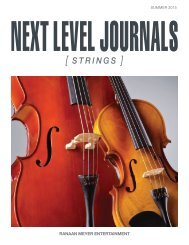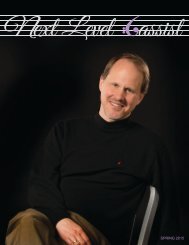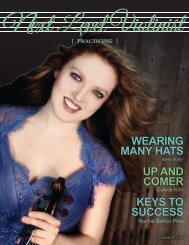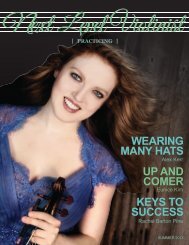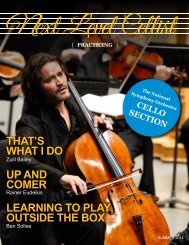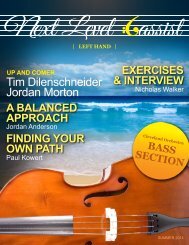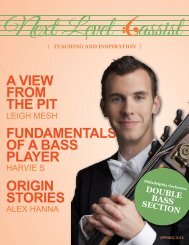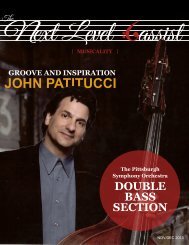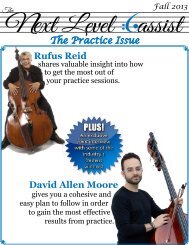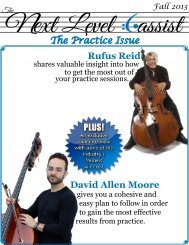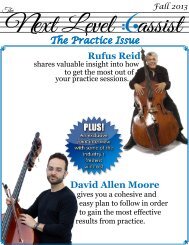Next Level Cellist Musicality Issue
Featuring articles by Alisa Weilerstein and Efe Baltacigil, a spotlight on the Chicago Symphony Cello section, and a duet by Ranaan Meyer
Featuring articles by Alisa Weilerstein and Efe Baltacigil, a spotlight on the Chicago Symphony Cello section, and a duet by Ranaan Meyer
You also want an ePaper? Increase the reach of your titles
YUMPU automatically turns print PDFs into web optimized ePapers that Google loves.
I<br />
have been inspired for as long as I can remember to play music.<br />
I was the driving force behind my decision to play the cello as<br />
a child. My parents are chamber musicians and were constantly<br />
practicing and rehearsing with colleagues in the house (my father was<br />
the first violinist of the Cleveland Quartet for 20 years). The Cleveland<br />
quartet rehearsed in my home until I was 7 years old, and on top of<br />
that my parents were constantly taking me to concerts and allowing<br />
me to be around musicians. My mother tells me, when I was about<br />
2 years old, I would constantly listen to her practicing. At one point<br />
she was practicing the Beethoven 32 Variations, and I would become<br />
extremely unhappy if she spent less time than I wanted practicing<br />
that piece. I would throw tantrums because I wanted to listen to the<br />
incredible music. When I was three, it became clear that I had<br />
perfect pitch, and I would play games with my mother where she<br />
would play chords on the piano and I would try to name all the notes<br />
- it was very easy for me, a game I could always win. When I was four,<br />
I started to ask, and eventually demand, a cello and a cello teacher. Six<br />
months later I had my first cello, and I don’t remember questioning<br />
for a moment that this was what I would do with my life, I just loved<br />
it from the start.<br />
In the first months, I would do perhaps 30 minutes of formal practice<br />
a day, but once I was finished with my Suzuki pieces or simple music,<br />
I would take the cello into my bedroom and play around with it for<br />
hours. It was my dream at that time to play the Dvorak cello concerto,<br />
even though I could barely pronounce the word cello! I would try to<br />
teach myself how to do it, and I ended up with some funny physical<br />
habits that I took years to undo. It was the philosophy of my parents<br />
and my teacher that I should love the instrument first, and worry<br />
about the mechanics later.<br />
I developed my sense of musical imagery very early. It started for me<br />
when I was hearing music as images and characters. The way that my<br />
parents rehearsed, they were always discussing what characters or<br />
colors they were trying to communicate. I got right away that all the<br />
practice wasn’t just aimed at technical perfection. When I first started<br />
to play the cello, I was thinking about that already.<br />
My parents are chamber music players, and so the communication<br />
between players and the inspiration one receives from colleagues<br />
was something I really got from them. They have a huge amount<br />
of personality in their own playing, and I think I was naturally,<br />
subconsciously drawn to that. They encouraged all these things<br />
in me when I started playing.<br />
I remember once I had worked with a teacher for one lesson at around<br />
age 8. I played for my parents, and they told me to try and show me<br />
what I had learned from the teacher. I did, and I was very focused<br />
on the technical side of my playing, which I might not have been fully<br />
aware of at the time. I’ll never forget the horrified look on my parents’<br />
faces! My dad worked with me relentlessly until I got my natural<br />
impulse back. Of course, the mechanics of playing are extremely<br />
important, but only if they are married to the music. I’ll never forget<br />
the look they gave me when I played without the impulse.<br />
What is the Impulse?<br />
The impulse is your own natural, primal response to music. It’s how<br />
it affects you emotionally, and rhythmically. The impulse is movement,<br />
because the heart of music is rhythm. The response to rhythm is<br />
harmony, how something makes you feel on the most basic level.<br />
If you’re really in touch with your impulse, you already know how<br />
to phrase. Of course, that has to be refined with training, by listening<br />
and understanding.<br />
At the risk of repeating myself, it’s about really marrying technique<br />
and music on the deepest level, so you can still be in touch with your<br />
impulse even if you’re working through mechanics, even with physical<br />
problems. Ultimately the goal is to communicate something naturally<br />
without any hindrances. That’s what technique is for. I would never<br />
advocate going easy on technical training - I had an extremely rigorous<br />
technical training - but you must never lose sight of the fact that it’s in<br />
pursuit of a larger goal. I advocate practicing in a very mindful way,<br />
investing all elements of music making into every note that you play,<br />
even if it’s open strings or a vibrato exercise. That’s my philosophy.<br />
The aspect of teaching that I find most interesting is the task of finding<br />
out what will reach a person. This idea that you can’t separate technique<br />
and music at any time is central to me. Even when practicing<br />
scales, you have to think about the harmony, phrasing, quality of<br />
sound, different colors that you want to produce. For some people,<br />
these points are obvious, but for others this concept is being uttered<br />
for the first time. Even for the people who know this, it’s good to have<br />
that nagging reminder to always practice mindfully.<br />
It seems to be a universal concern that people don’t know what<br />
to do in the practice room. This invariably comes out while they’re<br />
performing, whether because they feel uncomfortable, or because<br />
certain concepts in their minds aren’t able to come out in their playing.<br />
It takes hard work for all of us to do this, and I find it very helpful<br />
for students to hear that this is a shared challenge for musicians, not<br />
an embarrassing or shameful personal shortcoming.<br />
In my own practice, the best example is found in slow practice with<br />
the metronome. Even when I’m trying to make sure the mechanics<br />
of a passage are back in place, I’m always thinking about the structure<br />
and phrasing - even if I’m focused on intonation. I’ll be looking for<br />
new colors, new things to learn or to say through the piece. It’s a very<br />
disciplined approach to practicing. Once you’re beyond the point of<br />
learning the notes and where everything goes, I think that practicing<br />
at 2/3rds tempo gives you the strength and reflexes to play the piece<br />
and allows you to keep a slightly relaxed yet focused mind.<br />
Starting young gave me some advantages learning my instrument. I<br />
don’t think anything was conscious when I was a young child wanting<br />
to learn the Dvorak concerto. It started as the ultimate goal! When I<br />
really started to learn it, I was about 12. Taking a focused approach<br />
to learning the music, I found that the better I got, the more I realized<br />
I didn’t know. When I first started to learn the Dvorak, I was surprised<br />
at how quickly some things came to me. I had waited my whole 12-<br />
year life to learn this piece that everyone had told me would be too<br />
difficult, and now I found that I could play most of the notes! Later,<br />
when I was performing it a lot, I began to appreciate the depth and<br />
layers to the piece. I caught some of those things early on, but my<br />
understanding of its structure and musical complexity continues<br />
to develop even now. Every performer should endeavor to remain<br />
a student, and to look for the lessons in everything he or she plays.<br />
If you are hoping to achieve real success in music, try to absorb as<br />
much as possible. I went to a lot of concerts, listened to a lot of recordings,<br />
and studied a lot of scores on the path to my career. The other<br />
SPRING 2014 NEXT LEVEL CELLIST<br />
7




